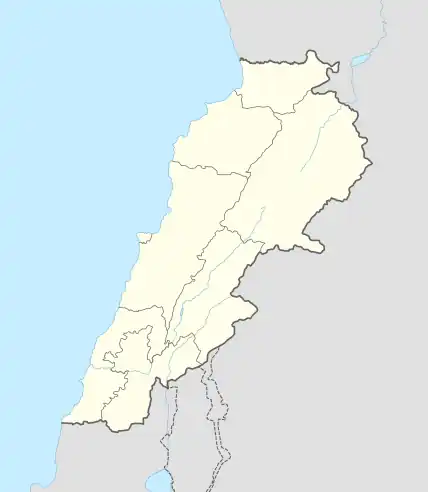| Organising body | Lebanese Basketball Federation (LFB) |
|---|---|
| Founded | 1951 |
| First season | 1951–52 |
| Country | |
| Confederation | FIBA Asia |
| Number of teams | 10 |
| Level on pyramid | 1 |
| Relegation to | Division 2 |
| Domestic cup(s) | Lebanese Cup |
| International cup(s) | FIBA Asia Champions Cup Arab Club Basketball Championship West Asia Super League |
| Current champions | Al Riyadi (17th title) (2022–23) |
| Most championships | Al Riyadi (17 titles) |
| TV partners | MTV (Lebanon) |
| Website | lebanon |
The Lebanese Basketball League is recognized as the top-tier professional men's basketball league in Lebanon. It is organized annually as a national championship with playoffs and a national cup by the Lebanese Basketball Federation (FLB).[1]
Currently, the league consists of 12 teams, of which six are located in Beirut. The most successful club in the history of the league is Al Riyadi.
History
The initial Lebanese basketball league was formed in as early as the 1950s; however, it was stopped during the Lebanese Civil War. In 1992, the league was reformed into a professional format.
In 1997, Sporting Club (Al Riyadi) finished as Lebanese champions, allowing them to participate in the 1998 FIBA Asia Champions Cup . There, they finished 3rd place. That same year, Al Riyadi lost the Lebanese championship to their rivals Sagesse Club (Hekmeh).
In 1998, Beirut hosted the Arab Club Championship. Hekmeh won, the first ever basketball trophy for Lebanon. In 1999, Beirut hosted the Arab Club Championship again. Hekmeh repeated as champions.
Al Riyadi has its greatest success in the Arab Club Championship during the 2000s. They won the title in 2005, 2006, 2007, 2009, and 2010. In 2009, they defeated their fellow Lebanese team Hekmeh in the final, the first time two Lebanese teams met in the final. The 2009 tournament was held in Beirut.
Overview
The league is the first division in Lebanese basketball. The team that finishes last each season is relegated to the Second Division, while the Second Division's top four teams compete in a play-off system. The team that wins is promoted for the next season.
Competition
There are 10 teams in the league. They play a round-robin format; each team plays all other teams once home and once away. At the end of the regular season, the top eight teams enter the playoffs and play a best of 5 series in the quarterfinals. The winners of the quarterfinals advance to the best of 5 series in the semifinals. The two teams that advance play a best of seven series in the final, and the winner is the league champion.
Teams
The following 10 teams play in the 2023–24 season.
| Team | City | Arena | Capacity |
|---|---|---|---|
| Al Riyadi | Beirut | Saeb Salam Arena | 2,500 |
| Antranik | Antelias | AGBU Demirdjian Center | 2,000 |
| Antonine | Baabda | Antonine Arena | 1,000 |
| Beirut Club | Beirut | Chiyah Stadium | 2,500 |
| Champville Maristes | Dik El Mehdi | Champville Club Center | 5,000 |
| Mayrouba | Jounieh | Club Central | 1,000 |
| Homenetmen | Mezher | Homentmen Mezher | 1,000 |
| Hoops Club | Dora | Michel El Murr Complex | 2,000 |
| NSA | Jounieh | Fouad Chehab Stadium | 1,200 |
| Sagesse | Ghazir | Antoine Choueiri Stadium | 5,000 |
Champions
Wins by year
- FLB League (standings since 1993)
Wins by team
| Club | Titles | Runners-up | Seasons won | Seasons runner-up |
|---|---|---|---|---|
| Al Riyadi | 17 | 4 | 1992–93, 1994–1995, 1996–97, 2004–05, 2005–06, 2006–07, 2007–08, 2008–09, 2009–10, 2010–11, 2013–14, 2014–15, 2015–16, 2016–17, 2018–19, 2020–21, 2022-23 | 2002–03, 2003–04, 2017–18, 2021–22 |
| Sagesse | 8 | 4 | 1993–94, 1997–98, 1998–99, 1999–00, 2000–01, 2001–02, 2002–03, 2003–04 | 2004–05, 2005–06, 2013–14, 2015–16 |
| Champville | 1 | 5 | 2011–12 | 2000–01, 2001–02, 2009–10, 2010–11, 2020–21 |
| Homenetmen | 1 | 1 | 2017–18 | 2016–17 |
| Beirut | 1 | 1 | 2021–22 | 2018–19 |
| Kahraba Zouk | 0 | 3 | 1992–93, 1993–94, 1994–95 | |
| Tadamon Zouk | 0 | 3 | 1996–97, 1997–98, 1998–99 | |
| Mouttahed | 0 | 2 | 2007–08, 2008–09 | |
| Antranik Beirut | 0 | 1 | 1999–2000 | |
| Blue Stars | 0 | 1 | 2006–07 | |
| Anibal | 0 | 1 | 2011–12 | |
| Byblos | 0 | 1 | 2014–15 | |
| Dynamo | 0 | 1 | 2022-23 |
Rivalries
The Big Rivalry
Other Rivalries
Notable players
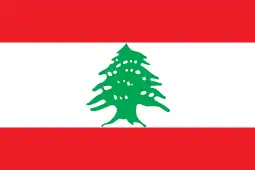 Bassel Bawji
Bassel Bawji Rony Fahed
Rony Fahed Rodrigue Akl
Rodrigue Akl Roy Samaha
Roy Samaha Ali Haidar
Ali Haidar Elie Stephan
Elie Stephan Elie Rustom
Elie Rustom Elie Mechantaf
Elie Mechantaf Ali Mezher
Ali Mezher Wael Arakji
Wael Arakji Mohammad Ibrahim
Mohammad Ibrahim Ahmad Ibrahim
Ahmad Ibrahim Amir Saoud
Amir Saoud Fadi El Khatib
Fadi El Khatib Joe Vogel
Joe Vogel Ali Mahmoud
Ali Mahmoud Brian Beshara
Brian Beshara Jean Abdelnour
Jean Abdelnour Sabah Khoury
Sabah Khoury Omar El Turk
Omar El Turk Ghaleb Rida
Ghaleb Rida Ali Kanaan
Ali Kanaan Billy Pharis
Billy Pharis Daniel Faris
Daniel Faris Matt Freije
Matt Freije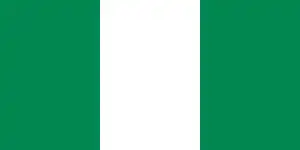 /
/ Ekene Ibekwe
Ekene Ibekwe.svg.png.webp)
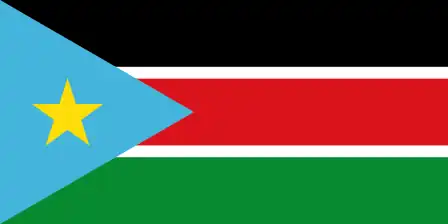 Duop Reath
Duop Reath Samaki Walker
Samaki Walker Cliff Alexander
Cliff Alexander Kerwin Roach
Kerwin Roach Hassan Whiteside
Hassan Whiteside Shabazz Muhammad
Shabazz Muhammad Rashad McCants
Rashad McCants Jeremy Pargo
Jeremy Pargo Norvel Pelle
Norvel Pelle Isaiah Austin
Isaiah Austin Danny Pippen
Danny Pippen JJ Hickson
JJ Hickson Mike Taylor (basketball player)
Mike Taylor (basketball player) Troy Williams
Troy Williams Diamond Stone
Diamond Stone Zach Lofton
Zach Lofton Kevin Murphy (basketball)
Kevin Murphy (basketball) Ace Custis
Ace Custis DeWayne Jackson
DeWayne Jackson Patrick Rembert
Patrick Rembert Dion Dixon
Dion Dixon Corey Williams
Corey Williams Brian Cook
Brian Cook Tony Madison
Tony Madison Alvin Sims
Alvin Sims C.J. Giles
C.J. Giles Darryl Watkins
Darryl Watkins Lee Nailon
Lee Nailon Herbert Hill
Herbert Hill Jumaine Jones
Jumaine Jones Loren Woods
Loren Woods Priest Lauderdale
Priest Lauderdale Dewarick Spencer
Dewarick Spencer Flip Murray
Flip Murray Desmond Penigar
Desmond Penigar Rasheim Wright
Rasheim Wright Marcus Haislip
Marcus Haislip Harold Jamison
Harold Jamison Andre Emmett
Andre Emmett Nate Johnson
Nate Johnson Marc Salyers
Marc Salyers Earl Barron
Earl Barron Scotty Thurman
Scotty Thurman Rick Hughes
Rick Hughes DeShawn Sims
DeShawn Sims Aaron Harper
Aaron Harper LeRoy Hurd
LeRoy Hurd Tre Kelley
Tre Kelley Sam Hoskin
Sam Hoskin Quincy Douby
Quincy Douby Ronnie Fields
Ronnie Fields Willie Burton
Willie Burton Marlon Parmer
Marlon Parmer Booker Woodfox
Booker Woodfox Reyshawn Terry
Reyshawn Terry DerMarr Johnson
DerMarr Johnson Rashad Anderson
Rashad Anderson Jerald Honeycutt
Jerald Honeycutt Terrell Stoglin
Terrell Stoglin Dickey Simpkins
Dickey Simpkins Cedric Henderson
Cedric Henderson Jeremiah Massey
Jeremiah Massey Ruben Patterson
Ruben Patterson Sherell Ford
Sherell Ford Jamal Robinson
Jamal Robinson Nate Robinson
Nate Robinson
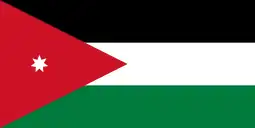 Dar Tucker
Dar Tucker.svg.png.webp)

 Ater Majok
Ater Majok Aleksandar Radojević
Aleksandar Radojević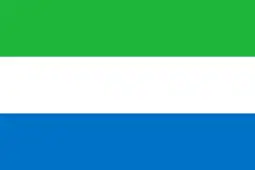
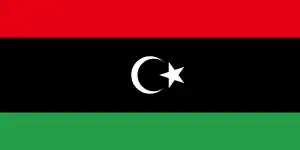 Alpha Bangura
Alpha Bangura Ismail Ahmad
Ismail Ahmad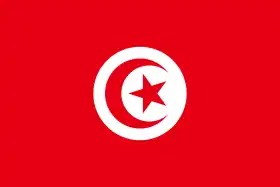 Salah Mejri
Salah Mejri Ali Traore
Ali Traore Ndudi Ebi
Ndudi Ebi Nikoloz Tskitishvili
Nikoloz Tskitishvili Jeleel Akindele
Jeleel Akindele Dalibor Bagarić
Dalibor Bagarić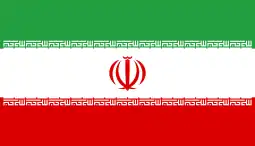 Asghar Kardoust
Asghar Kardoust Hamed Haddadi
Hamed Haddadi Ratko Varda
Ratko Varda Vladan Vukosavljević
Vladan Vukosavljević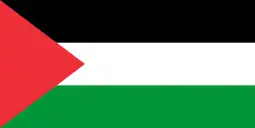 Sani Sakakini
Sani Sakakini Michael Madanly
Michael Madanly Marcus Banks
Marcus Banks Walter Hodge
Walter Hodge Makrem Ben Romdhane
Makrem Ben Romdhane Sam Young (basketball)
Sam Young (basketball)
 Rony Seikaly
Rony Seikaly
 Justin Brownlee
Justin Brownlee
Notable coaches
Women's league
2019–20 teams:
References
- ↑ "Asia-Basket". www.asia-basket.com. Retrieved 2021-05-25.
